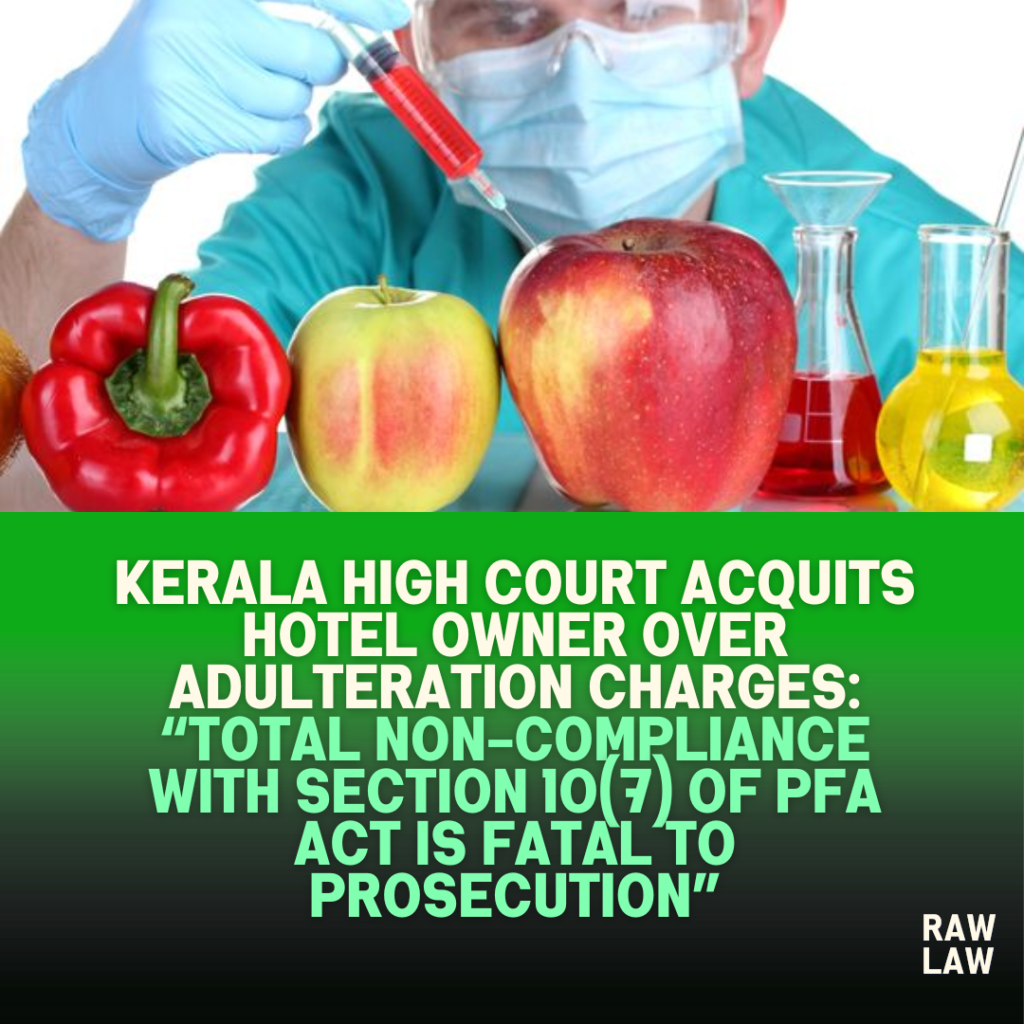Name of the Judgment
Raphy v. State of Kerala
Kerala High Court | Judgment dated 19 June 2025 | Justice Dr. Kauser Edappagath
Court’s Decision
The Kerala High Court allowed the criminal revision petition and set aside the concurrent findings of conviction and sentence against the petitioner for offences under the Prevention of Food Adulteration Act, 1954. The Court held that there was a “total non-compliance with the provisions of Section 10(7) of the PFA Act,” rendering the trial invalid. The petitioner was acquitted of all charges.
Facts
The petitioner, who ran a hotel in Balaramapuram, was prosecuted for selling adulterated smart drinks that allegedly contained the artificial sweetener saccharin, in violation of Sections 2(ia), 7(i), and 16(1)(a)(i) of the PFA Act and Rule 47 of the PFA Rules. The Food Inspector purchased 12 covers of the drink and sent them for testing, which confirmed adulteration. The petitioner had sought to implead the manufacturer, who was acquitted, while the petitioner was convicted and sentenced to six months’ simple imprisonment with a fine of ₹1,000. The appellate court upheld the conviction, prompting this revision.
Issues
Whether there was compliance with the mandatory requirement under Section 10(7) of the PFA Act, i.e., whether the Food Inspector called independent witnesses during sample collection.
Petitioner’s Arguments
Senior Counsel K. Ramakumar, for the petitioner, argued that there was a clear violation of Section 10(7) of the PFA Act. He contended that the Food Inspector failed to secure the presence or signature of any independent witness at the time of sample collection, which was a fatal flaw rendering the prosecution unsustainable.
Respondent’s Arguments
The prosecution contended that the Food Inspector had called independent witnesses, but they refused to sign the mahazar, and thus there was substantial compliance. They relied on the Division Bench ruling in Food Inspector v. Narayanan, which held that if witnesses refused to cooperate, strict compliance could be dispensed with.
Analysis of the Law
Section 10(7) of the PFA Act mandates that at the time of taking action under certain sub-sections, the Food Inspector “shall call one or more persons to be present” and take their signatures. Earlier, the requirement included “as far as possible,” but this phrase was removed by an amendment in 1964, reinforcing the mandatory nature of the provision.
Precedent Analysis
- Ram Labhaya v. Municipal Corporation of Delhi (AIR 1974 SC 789) – Supreme Court held that Section 10(7) imposes a mandatory duty to call independent witnesses but the Food Inspector cannot compel their participation.
- Food Inspector v. Narayanan (2003 (2) KLT 1035) – Kerala High Court Division Bench interpreted that while the provision is mandatory, the failure of persons to cooperate relieves the prosecution.
- Rajinder Kumar v. State of H.P. (2003) 11 SCC 120 – Reiterated the obligation to attempt inclusion of independent witnesses.
Court’s Reasoning
The Court found that although PW1 (the Food Inspector) claimed to have invited two independent witnesses, he failed to name them or provide any corroborative evidence. The only other witness (a peon) had no knowledge of such invitation, and a hotel employee listed in the mahazar was not examined. The Court ruled that the petitioner’s conviction could not be sustained solely on the uncorroborated claim of PW1. “There must be positive evidence to prove that the Food Inspector made earnest efforts,” and in this case, there was “total non-compliance with Section 10(7).”
Conclusion
The Court set aside the conviction and sentence imposed by both the trial and appellate courts. The petitioner was acquitted of all charges under the PFA Act, and the revision petition was allowed.
Implications
This judgment underscores the strict procedural compliance required under food safety laws. It clarifies that the failure to involve independent witnesses during the critical stage of sampling—without credible evidence of refusal—can vitiate the entire prosecution. The verdict reinforces that procedural safeguards are not mere formalities, especially in criminal trials.
Linked Judgments Referred
- Ram Labhaya v. Municipal Corporation of Delhi – Supreme Court ruling establishing mandatory nature of Section 10(7) but allowing exceptions if independent witnesses refuse.
- Food Inspector v. Narayanan – Kerala High Court clarified substantial compliance could suffice if genuine attempts were made.
- Rajinder Kumar v. State of H.P. – Supreme Court reiterated requirement of calling independent witnesses.
